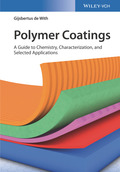Polymer Coatings
A Guide to Chemistry, Characterization, and Selected Applications

1. Auflage September 2018
XXVI, 568 Seiten, Hardcover
45 Tabellen
Praktikerbuch
A practical guide to polymer coatings that covers all aspects from materials to
applications
Polymer Coatings is a practical resource that offers an overview of the fundamentals
to the synthesis, characterization, deposition methods, and recent developments of
polymer coatings. The text includes information about the different polymers and
polymer networks in use, resins for solvent- and water-based coatings, and a variety
of additives. It presents deposition methods that encompass frequently used mechanical and electrochemical approaches, in addition to the physical-chemical aspects of the coating process. The author covers the available characterization methods including spectroscopic, morphological, thermal and mechanical techniques.
The comprehensive text also reviews developments in selected technology areas
such as electrically conductive, anti-fouling, and self-replenishing coatings. The author includes insight into the present status of the research field, describes systems currently under investigation, and draws our attention to yet to be explored systems. This important text:
-Offers a thorough overview of polymer coatings and their applications
-Covers different classes of materials, deposition methods, coating processes, and
ways of characterization
-Contains a text that is designed to be accessible and helps to apply the acquired
knowledge immediately
-Includes information on selected areas of research with imminent application
potential for functional coatings
Written for chemists in industry, materials scientists, polymer chemists, and physical chemists, Polymer Coatings offers a text that contains the information needed to gain an understanding of the charaterization and applications of polymer coatings.
Classes of Materials
Why Coatings and What Are Their Benefits
Various Applications: Electrical, Decorative/Protective, Wetting Behavior
Generic Problems: Independent of Application: Adhesion, Water/Environmental Resistance
Specific Problems: Dependent on Application: Gloss, Transparency
General Considerations: Multiple Property Relevance, Durability
Outline of Chapters and Selective Topics
POLYMERS AND POLYMER NETWORKS
Characteristics of Polymers
Ideal and Non-Ideal Networks
Kinetics of Network Formation
CLASSIC THERMOSET CHEMISTRIES
Petro-Based Thermoset Chemistries
Bio-Based Thermoset Chemistries
New Bio-Based Raw Materials for Renewable Thermosets
ALTERNATIVE CHEMISTRIES
Solvent-Borne and Water-Borne Coatings
Chemistry of (Hyper)Branched Resins and "High-Solids" Coatings
Powder Coatings
Water-Borne Coatings: Specific Aspects
Radiation Curing
ADDITIVES
Why Additives
Thickeners
Surface Active Agents
Surface Modifiers
Leveling and Coalescing Agents
Catalytically Active Agents
Special Effect Agents
APPLICATION METHODS
Laboratory and Industrial Methods
Dip-Coating
Doctor-Blade Coating
Spin-Coating
Spray-Coating
Electrophoretic Coating
An Example: Automotive Coatings
PHYSICAL-CHEMICAL ASPECTS
Solubility of Monomers, Polymers and Solvents
Intermolecular Interactions and Colloidal Stabilization
Wetting and Dewetting, CA, Regimes, Hysteresis, Topography and Chemistry
Rheology
Emulsions
Adhesion
CHARACTERIZATION
Chemical: IR, Raman, XPS
Morphological: OM, SEM, TEM, AFM, Confocal Optical Microscopy
Thermal and Mechanical: DSC, Rheological Measurements, DMTA, Hardness, Adhesion Tests
Bibliography
GENERAL CONSIDERATIONS
Generic Problems
Sustainability and Durability
Weathering and Water Sensitivity of Polymer Coatings
Color
ELECTRICALLY CONDUCTIVE COATINGS
Intrinsically Conducting: Bands, Defect Level, Conduction Mechanisms
Extrinsic: Particles, Fibers, Platelets, Percolation
Characterization: 2-Point, (Guarded) 3-Point, 4-Point, Lateral, Through-the-Depth, Frequency Dependence, C-AFM
HYDROPHOBIC AND HYDROPHILIC BEHAVIOR
Hydrophobic: Chemistry, Morphology, Effect of Particles,
Hydrophilic: Chemistry, Swelling, Friction, Integrity
SELF-REPLENISHING COATINGS
Concepts, Requirements and Assessment Methods
Heterogeneous: Capsules, Once-Only, Discrete
Homogeneous: Dangling Chains, Repetitive, Homogeneous
OUTLOOK
Present Status
Systems Under Investigation
Unexplored Systems


